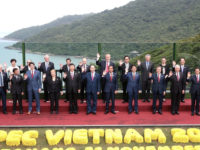Data localization rules, which require data to be stored locally, have emerged as an increasingly popular legal method for providing some additional assurances about the privacy protection for personal information. Although heavily criticized by those who fear that it harms the free flow of information, requirements that personal information be stored within the local jurisdiction is an unsurprising reaction to concerns about the lost privacy protections if the data is stored elsewhere. Data localization requirements are popping up around the world with European requirements in countries such as Germany, Russia, and Greece; Asian requirements in Taiwan, Vietnam, and Malaysia; Australian requirements for health records, and Latin America requirements in Brazil. Canada has not been immune to the rules either with both British Columbia and Nova Scotia creating localization requirements for government data.

Cooperation in the Pacific Rim by Jakob Polacsek, World Economic Forum (CC BY-NC-SA 2.0) https://www.flickr.com/photos/worldeconomicforum/48179628441
Digital Trade
Canada’s Lead Negotiator Confirms Government Seeking Net Neutrality Safeguards in NAFTA
Steve Verheul, Canada’s lead NAFTA negotiator, appeared before the Standing Committee on International Trade earlier this week to provide an update on the negotiations. In addition to confirming Canada’s commitment to a cultural exception (Verheul acknowledged that the U.S. “has not reacted positively”), Verheul was asked about the digital trade chapter. He indicated that there has been significant progress on issues such as online consumer protection and privacy. He also touched on two other issues: one a Canadian ask and the other a U.S. priority.
From a Canadian perspective, Verheul said that Canada wants a net neutrality provision included in NAFTA, noting:
Canada’s Missing Internet Provision: Why NAFTA Offers the Chance to Establish Long Overdue Online Speech Safeguards
During the earliest days of the commercial Internet, the United States enacted the Communications Decency Act, legislation designed to address two concerns with the rapidly growing online world: the availability of obscene materials and the liability of Internet services hosting third party content. While the obscenity provisions in the 1996 law were quickly struck down as unconstitutional by the U.S. Supreme Court, the liability rules emerged as a cornerstone of U.S. Internet policy.
The rules, which many regard as the single most important legal protection for free speech on the Internet, establish a safe harbour that ensures online services are not liable for the content posted by their users. My Globe and Mail op-ed notes that over the past two decades, the CDA Section 203(c) provision has been used by every major Internet service – from Google to Amazon to Airbnb – to ensure that courts, not private companies, determine what is lawful and permitted to remain online.
Bursting the IP Trade Bubble: Canada’s Position on IP Rules Takes Shape With Suspended TPP Provisions
In the months following the conclusion of the Trans Pacific Partnership, critics pointed to many specific problems in the text with respect to intellectual property, culture, privacy, and dispute resolution. TPP defenders consistently dismissed those concerns, yet last week’s successful Canadian demand to suspend many of the most problematic IP provisions (along with holding out for reforms to the cultural exemption) confirms that the government has recognized the validity of the criticisms. The government may yet cave to U.S. pressure in the NAFTA renegotiation, but it has established a clear position on culture and IP that better reflects the national interest.
No Deal is Better than a Bad Deal: Why Canada Won the TPP By Standing Up for Balanced IP, Culture, and the Auto Sector
The end-game in trade negotiations always generates more than its fair share of drama and last week’s effort to re-work the Trans Pacific Partnership without the United States was no different. Canada was squarely in the spotlight with Prime Minister Justin Trudeau a no-show at a ministerial meeting that was attributed to a scheduling error, but had the hallmarks of gamesmanship designed to demonstrate a willingness to walk away from the deal.
I posted over the weekend on some of the key IP provisions that have been suspended and published an op-ed in the Globe and Mail that argues that the result was a major win for Canada as the government leveraged its position as the second largest economy left in the TPP to extract significant concessions on intellectual property, culture, and the auto sector. Indeed, despite pressure to cave on key demands from the Japanese and Australian governments, Canada stood its ground and is helping to craft a trade deal that better reflects a balanced approach on challenging policy issues.











